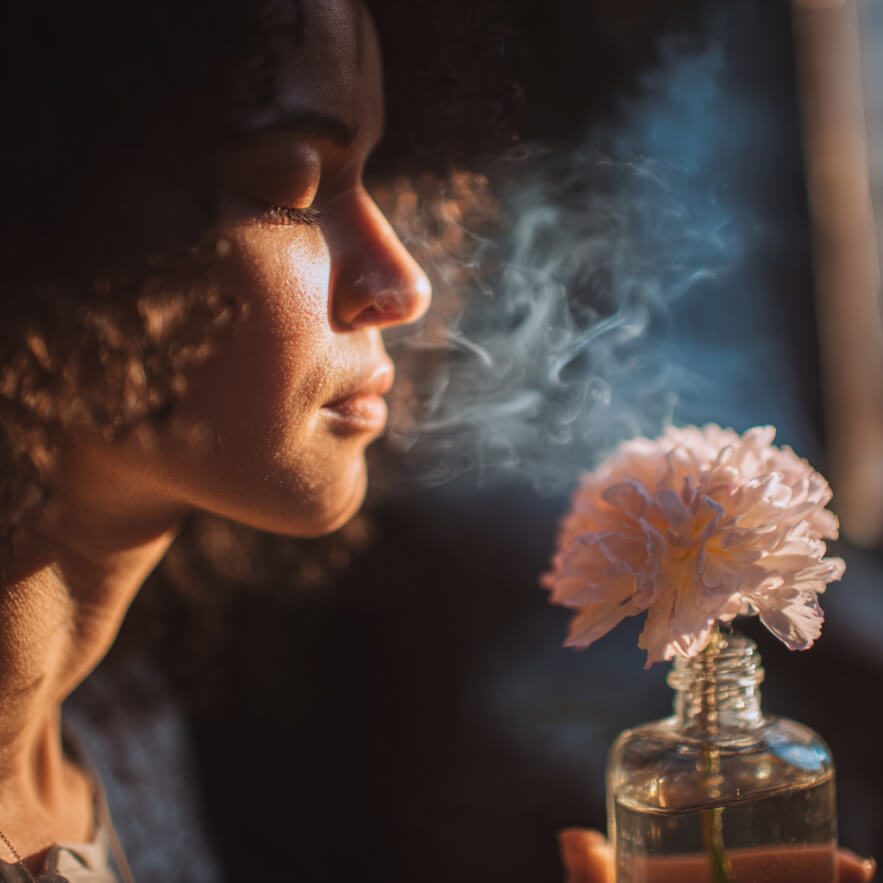People often perceive scents as something secondary — a pleasant background in a space or a subtle detail in perfume. But a scent can trigger complex processes in the brain, awaken memories, influence behavior, reduce anxiety levels, and even support depression therapy. This isn’t magic or mysticism — it’s biochemistry and neuropsychology, which are only now being revealed through new research.
How smell works: from molecule to emotion
When a person inhales a scent, olfactory receptors in the nose bind to molecules of the substance. These receptors send signals directly to the olfactory bulb, which is connected to the limbic system of the brain — the region responsible for emotions, memory, and associations. That’s why the smell of fresh pastries can suddenly evoke a sense of comfort or childhood longing.
Unlike vision or hearing, smell bypasses the brain’s “rational filter” — information from scents reaches the brain directly, without prior logical processing. This makes the reaction to smells extremely fast and deeply personal. For example, lavender may relax one person and irritate another — it all depends on personal associations.
In addition, scents influence neurotransmitter levels such as dopamine, serotonin, and norepinephrine. Studies have shown that certain essential oils can activate brain regions related to joy, calmness, or focus. This explains why aromatherapy can support emotional well-being.
Mood and scent: is there scientific evidence?
Scientists have long been interested in how scents influence the psyche. One classic study was conducted in hospitals where bergamot essential oil was used to reduce pre-operative anxiety in patients. The results showed a real drop in cortisol levels and improved subjective well-being.
Another example is lavender and its impact on sleep. In multiple controlled experiments, inhaling lavender oil before bed was found to increase deep sleep phases and improve overall sleep quality. Notably, high concentrations aren’t necessary: even a small amount on a pillow or in a diffuser can have an effect.
Citrus oils like orange, lemon, and grapefruit also receive special attention. They’re often used in aromatherapy to counter symptoms of apathy and chronic fatigue. Users report that these scents help boost energy, enhance focus, and reduce morning grogginess.
It’s important to understand that aromatherapy doesn’t replace medication, but it can be a supportive tool for emotional self-regulation — especially when used regularly and thoughtfully.
Scent and memory: how associative mechanisms work
Everyone has experienced it: a faint scent suddenly transports you to the past — a kindergarten, a seaside vacation, or your grandmother’s kitchen. This happens because the olfactory system is directly linked to the hippocampus, the brain’s memory formation center.
“Nothing is more memorable than a smell.”
— Diane Ackerman, author of A Natural History of the Senses
“Ничто не запоминается так, как запах.”
Interestingly, scents are “recorded” in memory more quickly and firmly than visual or auditory stimuli. A single breath of a familiar scent can evoke vivid details — even colors of clothing or exact emotions from that moment. This phenomenon is used in treating PTSD: a familiar, calming scent can help restore a sense of safety.
Many professionals apply the scent anchoring method — a technique where someone intentionally links a certain scent with a positive state. For instance, listening to favorite music while inhaling ylang-ylang can create a stable association. Later, just the scent can evoke the desired emotional state.From a practical standpoint, it’s best to choose neutral or positive scents for anchoring and avoid strong or unfamiliar ones. Memory and emotion are tightly intertwined — one bad experience may permanently spoil your perception of a particular oil.
How to choose the right scent for your state
Choosing an essential oil or blend shouldn’t be random. It’s important to consider both personal preferences and the intended effect. A scent that works wonders for your friend may not suit you at all.
A good strategy is to test oils in different conditions. The same scent can feel very different in the morning versus the evening, or in a relaxed versus stressed state. So before making regular use of an oil, it’s helpful to observe your reactions to it over a few days.
Professional aromatherapists recommend keeping an aroma journal. This could be a notebook or notes app where you log your response to each scent: what emotions it evokes, how your mood changes, and any side effects. Over time, this helps create your own “aroma map.”
Here are key factors to pay attention to when choosing a scent:
- bodily reaction (dizziness, alertness, drowsiness);
- associations and memories;
- current emotional needs (relaxation, focus, energy);
- duration and strength of the scent.
This approach transforms scent selection from a simple purchase into a personal tool for influencing your emotional state.
Mistakes and myths: why aromatherapy doesn’t work for everyone
Despite growing scientific support, aromatherapy still faces skepticism. One reason is improper use. For example, applying undiluted oil directly to skin can cause irritation or allergic reactions, while an overly strong scent may trigger headaches or rejection.
Another issue is low-quality oils. Many products on the market are synthetic and lack therapeutic benefits. A high-quality essential oil should be 100% pure, with no additives. Professionals recommend checking for Latin plant names, country of origin, and extraction method.
It’s also crucial to understand that scents are a supportive tool, not a cure-all. They won’t solve deep psychological issues but can ease the therapeutic process and make daily life more balanced.
Sometimes, a scent seems ineffective simply because we don’t give ourselves the space to relax. We may run a diffuser next to a laptop but stay in high-alert mode. Yet inhaling mindfully, with attention and presence, activates emotional pathways more effectively.
If you’d like to explore how perfumery can become part of a personal relaxation ritual, check out the article “Montale Paris perfumes as part of a personal ritual of relaxation and self-care”. It offers practical guidance on choosing and using scents for comfort and harmony
Questions and answers
Lavender, neroli, and frankincense are most commonly used for anxious states. But effectiveness varies by individual, so it’s best to test them separately.
Some effects (like relaxation or alertness) may appear within 2–5 minutes. Memory and mood support develop with consistent use.
Yes, but it’s important to follow safety guidelines. Start with 2–3 oils, test each individually, and always dilute with carrier oils.

